Back to Everyday Sales Superheroes
Scaling Heights in Sales and Rock Climbing: Levi Shmulsky’s Story
Written by: Sean McAlindin
Sean McAlindin, a business and arts writer, has a decade-long experience in music and culture journalism and recently ventured into business writing.
Edited by: Sallie Middlebrook
Sallie, holding a Ph.D. from Walden University, is an experienced writing coach and editor with a background in marketing. She has served roles in corporate communications and taught at institutions like the University of Florida.
Updated on March 21, 2024
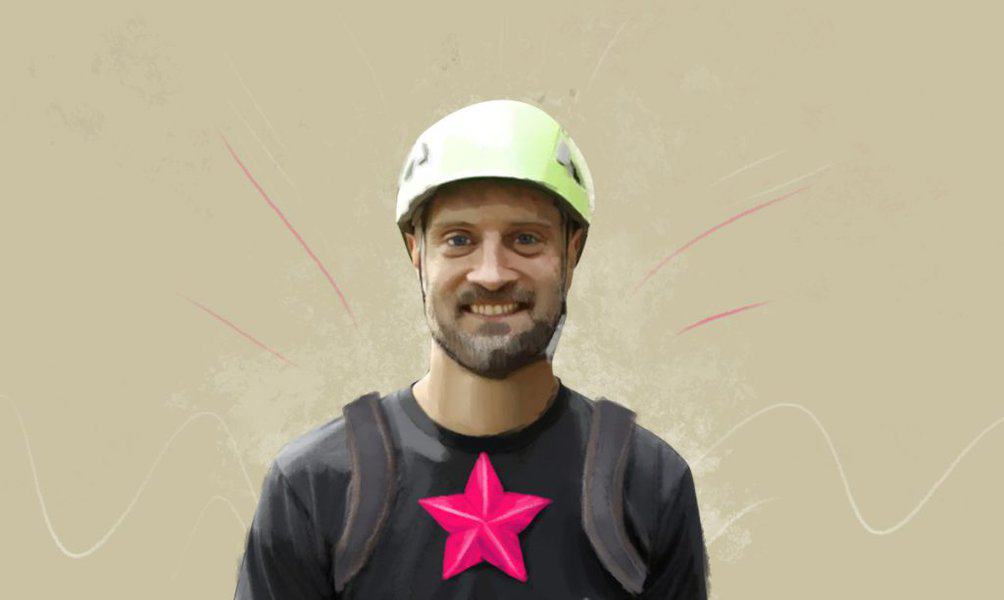
This edition of Everyday Sales Superheroes focuses on uncovering the secrets of successful salespeople from all walks of life. In a business landscape full of lifestyle gurus and self-declared experts, we want to hear from ordinary folks who have actual boots-on-the-ground sales experience that resonates with our readers.
In these conversations, there will be no posturing or hyperbole, just real-life talk with veteran sales professionals who are making a difference in the lives of their companies and their customers.
As you read this installment of Everyday Sales Superheroes, keep in mind that we’re presenting these interviews so that you can learn from the mindsets and action steps of everyday salespeople who are the best at what they do.
A Conversation with Rock Climbing’s Traveling Salesman
Levi Shmulsky was born in rural Berkshire County, Mass. in 1981. The youngest of four children of a self-employed general contractor and an elementary art teacher, Shmulsky studied anthropology at UMass Amherst before moving to Colorado.
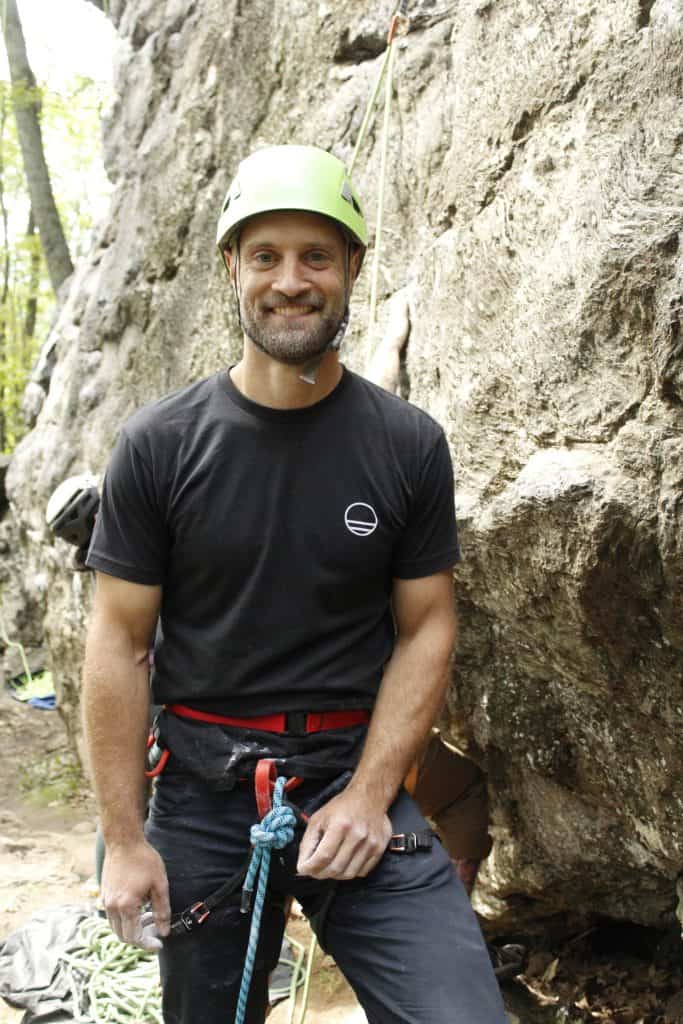
After working labor jobs, at the gentle nudging of his mother, he applied for a management trainee position with 84 Lumber in Fort Collins. During a 17-year career as a lumber salesman, Shmulsky moved up the ranks and relocated several times, eventually ending up in Fresno, Cal.
When his first daughter, Sophia, was born in 2010, the family decided it was time to move closer to home. 84 Lumber relocated Shmulsky to Plainville, Conn., where he started to take up a new hobby — rock climbing.
As Shmulsky dove deeper into his newfound passion, he began to notice a lack of available options for purchasing high-quality climbing equipment from knowledgeable salespeople.
It gave him an idea. He started small — demoing shoes from boxes in the back of his car at climbing gyms around the Northeast. Eventually, he bought a trailer, which now serves as his traveling caravan of climbing equipment.
As the founder, owner, and sole employee of Talcott Mountain Sports, Shmulsky travels to climbing gyms and festivals throughout southern New England to sell his curated selection of gear and share his knowledge with both veteran and novice climbers.
Shmulsky and I first met when I spotted his trailer outside Central Rock Gym in Glastonbury, Conn. I was impressed by his friendly demeanor, entrepreneurial spirit, and convenient selection of fantastic gear. Even my six-year-old daughter and her friend thought the trailer was super cool.
As it turns out, he and I live ten minutes from each other in the Farmington Valley, so we became fast friends and climbing partners. A couple of weeks ago, Shmulsky and I sat down for a conversation about sales, business, life, and climbing.
Exploring Roots
MTS – How did you get into the outdoors?
Levi – Where I grew up in New Marlborough, it is basically just woods. This was in the days before cell phones and video games were still really simple, so we would mostly just play outside. My friends and I would always be outside on trails, playing some kind of sports in the front yard or exploring the woods, rivers, and mountains around us.
MTS – What inspired your interest in anthropology?
Levi – I had a real curiosity for people and how groups of people come together and organize themselves. I was always naturally interested in how people think, how that affects their behavior, and why they act the way they do.
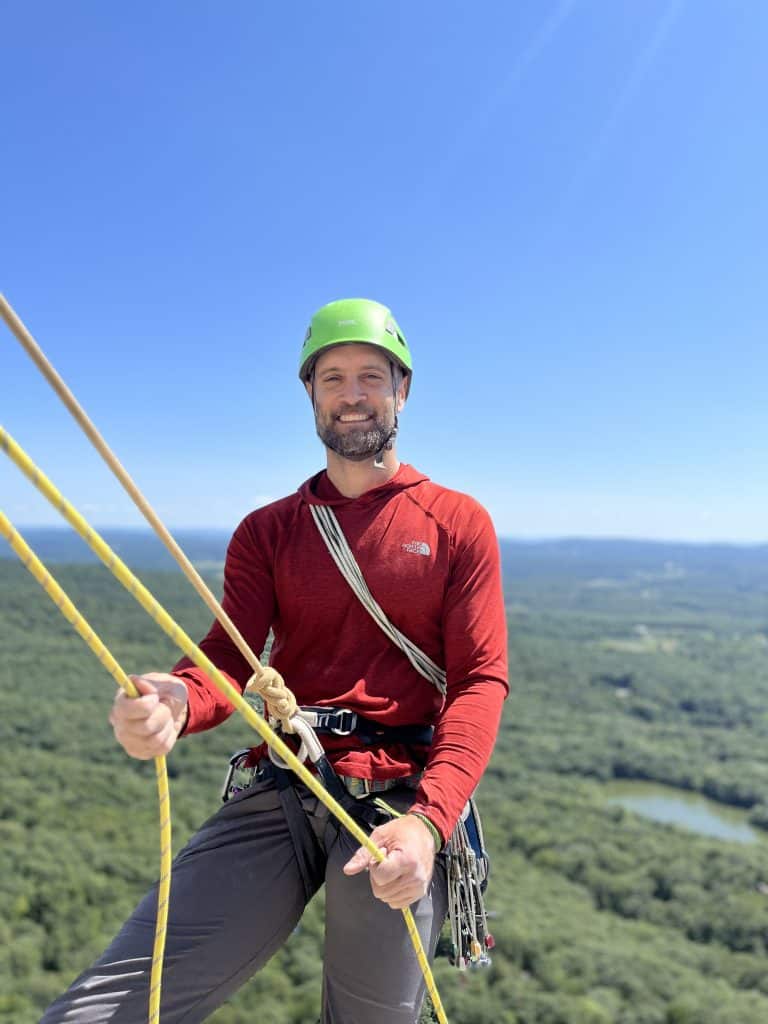
Sales Journey
MTS – How did you get your first sales job?
Levi – Because I had grown up in the construction industry, working with my dad on jobs, I felt competent in the lumber company domain. I was basically selling the materials to the guys who were doing the jobs I had grown up doing.
The manager trainee position of 84 Lumber talked a lot about a rapid training and promotion program — that you could come in as a trainee, but once you applied yourself, passed some coursework, and had a little experience, you could move up to assistant manager and then store manager.
So, I went and applied and got that job, and that’s how I got into the lumber industry, which is where I eventually ended up as an account rep salesperson.
MTS – What did you like most about that job?
Levi – What I liked about it was the advancement opportunities. It was an industry that I was very familiar with. I understood construction. I liked the customers coming in the door every day that I was helping. I had a rapport with them. I understood people, what they needed, and how to communicate.
So, it just seemed like an easy thing that I could do. I had the skills to do it right off the bat. All you had to do was show up and do your work, and you were better than most of the rest.
You can have a very lucrative career in lumber just because of the amount of dollars that are trading hands. Think about the cost of building houses. That’s a lot of dollars. There’s a lot of incentives in that line of work where if you can produce more sales, if you can help more customers, if you can hit certain budget numbers, you get a cut of the profit.
Initially, I was in the management route as opposed to sales. But what I really liked about sales was they offered it up as a small business opportunity. And realistically, I always wanted to run my own business and be self-employed.
I look at how my dad did it. He never had a regular job, so to speak, but he found opportunities to make money with his skills. He ran a business, and it evolved over time.
Climbing Passion
MTS – How did you get into rock climbing?
Levi – In 2016, I started hiking a lot in the White Mountains in New Hampshire. One weekend a month or as often as I could, I was going to hike 4,000-footers up there with some guys. In between, I was doing local hiking around Connecticut.
I started falling in love with the outdoors and a lot of the stuff that I grew up doing, but now on a bigger, more intentional scale. I guess I had started wanting to take care of myself again, and part of that was hiking a lot. So, after a couple of years of that, I really loved it, and I wanted more of an experience.
I had always been aware of rock climbing, but I never thought it was something I would do. I didn’t know how a person even begins to do that. In December 2017, I decided to go down to the gym in Glastonbury and take an introductory lesson to see what my capabilities were. Central Rock does a free introduction to climbing class when you sign up for a membership, so I went and took that and was basically hooked from day one.
MTS – What’s your favorite place to climb?
Levi – Oh, man. Well, I haven’t climbed outside of the Northeast, so I have a very limited scope or ability to answer that. As much as I love the Gunks, when I really think about all the different climbing opportunities for me, it’s probably New Hampshire.
I really like alpine-style, back-country climbing. I’d rather have a little bit of a journey to get there and then figure out the climbing while you’re there. It’s more about the whole package, not about just the climbing itself.
I would say my favorite climbing is anything that has more of an adventure element to it. I love the long days and the problem-solving aspects that go with that.
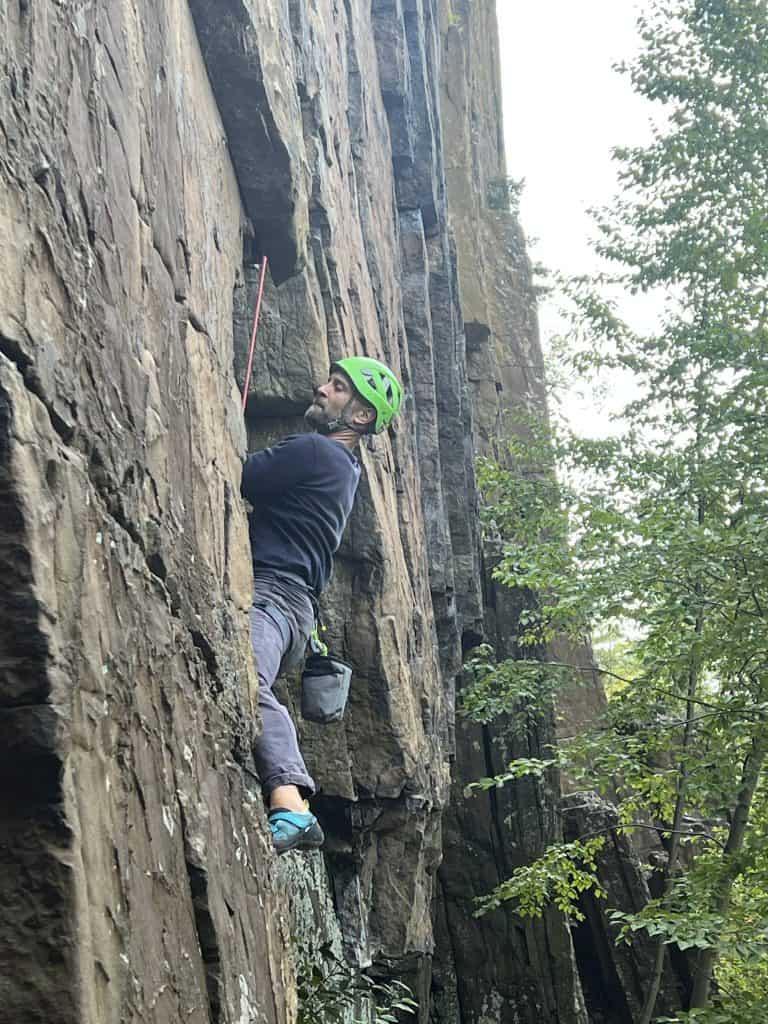
MTS – What’s the most memorable climb you’ve done?
Levi – Whitney Gilman Ridge at Cannon Cliff in New Hampshire.
Entrepreneurial Spirit
MTS – How did you come up with the idea for a traveling rock climbing equipment company?
Levi – By 2020, I’d been climbing for two years, and now I’m paying attention to where people get their equipment. When you start climbing, all this climbing stuff is cool — all the trad gear, the shoes, and a variety of stuff — and it’s part of this thing that I’ve just made into my number one hobby.
It struck me that any time you wanted to go have a really good selection of equipment and pick out a pair of shoes and try some things on that, Rock and Snow in New Paltz, New York was the closest place you could go for a selection. That’s over two hours away.
I got my first pair of shoes at the gym, and I just bought whatever they had in stock. Then, for my second pair of shoes, I did the same thing. Then, I tried ordering a pair online, and those shoes just didn’t feel good at all, and I had to try to sell them. So, I didn’t have a good experience with that.
Then, I decided to buy a pair of shoes in New Paltz. But when I got home, I felt like I probably got something that was a little too small. So, I ended up driving back out to New Paltz to do an exchange.
So, for my first two years of climbing, I was experiencing all these same issues that people talk about, which is that ordering shoes online kind of sucks. REI doesn’t have a good selection, and if you wanted to go anywhere with a good selection, unless you happened to be stopping in and buying a pair while you were on the climbing trip, it wasn’t convenient because it was quite out of the way.
I noticed that a lot of people were in that same boat, and something about it raised my interest. I thought, “You know, people deserve a better option where they have some selection, and they can try stuff on, and someone should do that.”
And then it was like, “Well, why wouldn’t I be the person? Why couldn’t it be me that would do that?” So it grew out of my own feeling that I want this, and I think other people want this, too.
MTS – How did you go about starting Talcott Mountain Sports?
Levi – It started to take shape in 2020 during COVID. I had known for quite a while that I was done with lumber. Like I said, I was in that industry for 17 years, and it was a good first career, but I knew it wasn’t what I wanted to do forever.
But I didn’t want to leave just for the sake of leaving. I didn’t want to start over in a different industry that I would just get tired of or make some lateral move and get burned out on something different over time.
So, I thought for a long time before I made any moves. After a couple of years of climbing, it was obvious to me that we didn’t really have the resources around us for climbing shoes and climbing equipment. You can’t just go into any store and buy the stuff.
It got me thinking that there was a demand for in-person rock climbing shoes, particularly. I thought that would be something interesting to do, but you have the obvious hurdle of starting a retail store. That takes a lot of money. To open a retail store, you need a ton of inventory, employees, insurance, and real estate, and you probably have to build the space to suit your needs.
I knew there were a ton of costs in launching a physical space. However, after brainstorming with some friends, I came up with the idea of a mobile business and, particularly, a trailer.
The first step was seeing if I could sell shoes inside the gym. I started by bringing in a few boxes of shoes and setting them up on a tabletop. I basically had four or five cartons of shoes in my trunk all the time. I would set up on a tabletop at various gyms and try to sell the shoes.
Right from the beginning, I realized that they would eventually sell. It was like the more I had, the more I could sell. The only thing holding me back was having the right shoes for each customer when they came up because people were buying these shoes.
So, I guess it was kind of just what I could afford to do. At the same time, I was getting more confident that it was a good investment to keep building the inventory that I had.
Growth and Challenges
MTS – So, even when you were selling shoes at gyms out the back of your car, you noticed a positive response from climbers right away?
Levi – Exactly. I reached out to a bunch of brands. I got a partnership with Unparallel Sports. I really liked their product. They were interested in my concept of how I was gonna do sales. I’d take 55 boxes of shoes, bring them into the gym, set them up on a tabletop, and do a demo. But instead of a demo, they were all brand-new shoes that you could actually take home that day.
If you climb in gyms long enough, you eventually probably experience a shoe demo. But with most of the shoe demos, you don’t get to go home with shoes that day. You climb in some shoes and you can order a pair of shoes if you want, and then you can wait like a month for the shoes to show up. If you want shoes that day, then it’s not your thing.
What I noticed people really liked about what I was doing was that they could go home with shoes that day. There was definitely something unique about it. I think the immediacy and convenience definitely appealed to people.
They didn’t have to go anywhere. I was inside the gym, and I had the shoes with me. You can have this pair of shoes today. All those factors seem to resonate with them.
The concept of supporting a small vendor also seems to really connect with people. I think the climbing community, in general, appreciates the underdog approach. There’s still a little bit of a counterculture vibe inside the climbing community. So, supporting a business that wasn’t a big box store resonated with a lot of people.
That’s what motivated me early on. I basically just always reminded myself that I could put together the elements. I understand the retail operations. I can build a business around this, and it’ll be successful. If climbers want it to be successful, it’ll be successful because they’ll support me with their business. It was really confidence-inspiring to see people buying stuff because I was there and doing it, and they wanted to help me out.
MTS – When did you decide to purchase the trailer and expand into other climbing products?
Levi – I believe it was 2021. Things had been going well for me inside the gyms. I would get there and get set up. I would usually have a good day, but it was a lot of work bringing the boxes in and out, and I was kind of limited in what I could logistically handle.
I was driving a car with stuff loaded in boxes, wheeling the boxes into the gym, setting up the tabletop, and selling what I could that day. At the end of the night, I boxed it back all up and wheeled it out again. I locked it up in my car, came back the next day, and reset it up. It was a lot of set-up and breakdown.
I had the concept that if I just had everything already set up all the time in a trailer and could have people come out and see what was there, I could have more stuff for sale, and it would be way more efficient. I think it would also bring credibility as opposed to just a guy wheeling in boxes of gear. It could give me some legitimacy.
It was the very beginning of 2022 when I first opened the trailer. I had to order it, and it was the middle of COVID, so it took a long time for it to come. But I think I got it at the end of 2021, and I had it on the road in 2022 towards the beginning of the season.
Once I had the trailer, I had more space to fill, and I could have more inventory, such as harnesses, ropes, carabiners, and everything else that comes with climbing. When you’re just lugging boxes around, you’re limiting yourself with how much you’re going to show up with. So, there was a big expansion of inventory to fill the trailer.
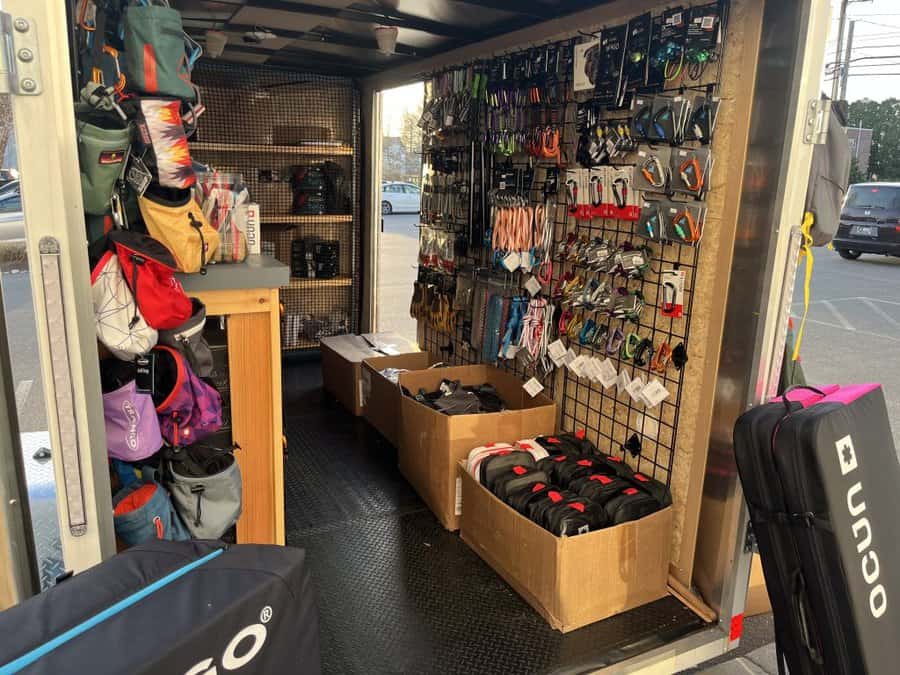
MTS – Did you take out a loan to do that?
Levi – I did. I got a line of credit in place so that I would have financing from which I could draw. Fortunately, I had some retail knowledge of how businesses want to structure inventory and how to pay for it — how to buy it the right way, so to speak. I do have some background in running a retail store, and that helped me understand strategically how I wanted to buy my inventory.
MTS – Are shoes still your biggest seller?
Levi – Yes, by far.
MTS – Where do you go with the trailer?
Levi – I travel throughout Connecticut, Rhode Island, Massachusetts, and New Hampshire. My regular route involves between six and eight gyms or locations, and at this point, I’ve gone to enough that they pretty much tell me they’re happy to have me any time. So, it’s sort of an open-door policy.
Central Rock is probably my biggest partner, and they have multiple locations. There’s also Beta Climbing and Fitness in Stanford, [Conn.] Barn Door Hostel and Campground in Rumney, [N.H.], and New Hampshire Climbing and Fitness.
Then, there are a few outdoor climbing competitions and events that I regularly set up at. Rumney Craggin’ Classic and the Rhode Island Ripper at Lincoln Woods, Rhode Island, are both big annual events for me.
Modern Salesmanship
MTS – How do you feel being a 21st-century traveling salesman?
Levi – Well, it’s interesting because when the idea was launched, it seemed like a very new idea. I was thinking of it as a new concept that was like the food truck craze that went on a few years before. I was combining the food truck concept with a retail store. And to me, it seemed very fresh and new, like we were breaking ground.
But after I did it for a little while, I realized that this goes back to the most ancient form of sales: people traveling the Silk Road with their wagons and stopping from town to town selling their stuff. That kind of hit me later.
I think it’s definitely cool that there’s this human historical pattern that happens, and now I’m kind of doing that in a modern way.
MTS – Have you thought about traveling further afield to expand your business?
Levi – I do for the shoe demos, but that’s separate from the trailer business. I don’t generally bring the trailer to New York or New Jersey. Getting it into cities is not ideal. There are some other reasons that have to do with business licensing and how those states are for working with it.
New York is very complicated, specifically for a small business like mine. There are a lot more hoops to jump through to do business there. So, I decided to focus on southern New England and keep it simple for now.
But the demos (which are not part of the same business) I can take anywhere. I go with that all the way out to Ohio and down to Virginia and everywhere in between.
When I do demos, I work as an independent rep for Unparallel. I’ll show up and demo and then people can either order the shoes off my website, or they can order the shoes directly from Unparallel. It’s sort of beneficial to me, no matter how that goes.
MTS – So, you get paid a commission for the demos.
Levi – Yep, but it’s not a very lucrative thing. There’s no travel expense, and you’re strictly paid your commission for the wholesale price of the shoes. What you’re looking to do is identify gyms that want to actually carry products.
If I’m there to do a demo, let’s say five is maybe an average, middle-of-the-road number of shoes to sell at a demo, and 10 would be a great demo. Either way, by demoing, you’re just covering your cost of getting there and making a few dollars if it goes well, but it’s not something that you could make a living doing. Even if I demoed seven days a week, I would not make a living.
You need gyms that also carry products because then you get commissions at the demo, but you also get everything that the gym buys all throughout the year. That’s what you’re shooting for.
Entrepreneurial Insights
MTS – What is your favorite part about owning your own business?
Levi – The freedom of being my own boss. The creativity, building a business every day that you work on. You’re deciding how best to spend your time and energy, and that ends up feeling like a pretty creative process to me, which I enjoy.
I like all the people I’ve got to meet along the way. I have a community of people at each gym that I go to regularly. It’s great seeing some familiar people every time I come back.
I have a vision of my store being a hub where people can congregate, hang out, and talk about climbing or just life in general. You know, have it be a community space as well as a store. Building the community around it is a big motivator for me.
MTS – In your opinion, what are the advantages of mixing lifestyle and work?
Levi – The advantage can also be the disadvantage. You’re doing something you love. On the one hand, you get to earn a living by doing work in the climbing domain, and that brings me more involvement in the things that I love.
On the other hand, there’s no turning it off. Sometimes, that can be a blessing and a curse. If you want to escape and do the thing you do for fun without having it be about work, sometimes work gets pulled into it, and vice versa.
But all in all, it’s definitely been an advantage. I’m really happy I’ve done it. Work doesn’t feel so much like work when you get to choose what you do.
MTS – How do you balance the human angle of selling with a more scientific approach?
Levi – Metrics and data can really be harnessed, but they’re so bland and dry. I feel like salespeople, personality-wise, are often more adventurous and emotional. In sales, you have to connect with people. I feel like the real techie, CRM, and data-driven sales are not what I was interested in so much, but they’re a necessary evil now.
MTS – What are the biggest challenges you’ve faced in growing your business?
Levi – The biggest challenge I face now is when to make the decision about expanding the scope of the business. I’m currently doing as much as I can on my own.
As a business owner, I want the business to move toward a more ownership-based model, where I don’t have my hand in every single thing all the time. I want a business that runs, and then I manage it and am involved in it, but it’s more than just me.
The biggest challenge is planning the next leg of expansion. In terms of renting space, having employees, and taking on more risk, it means finding out if there’s enough business to support it and what amount of expansion would be safe and profitable.
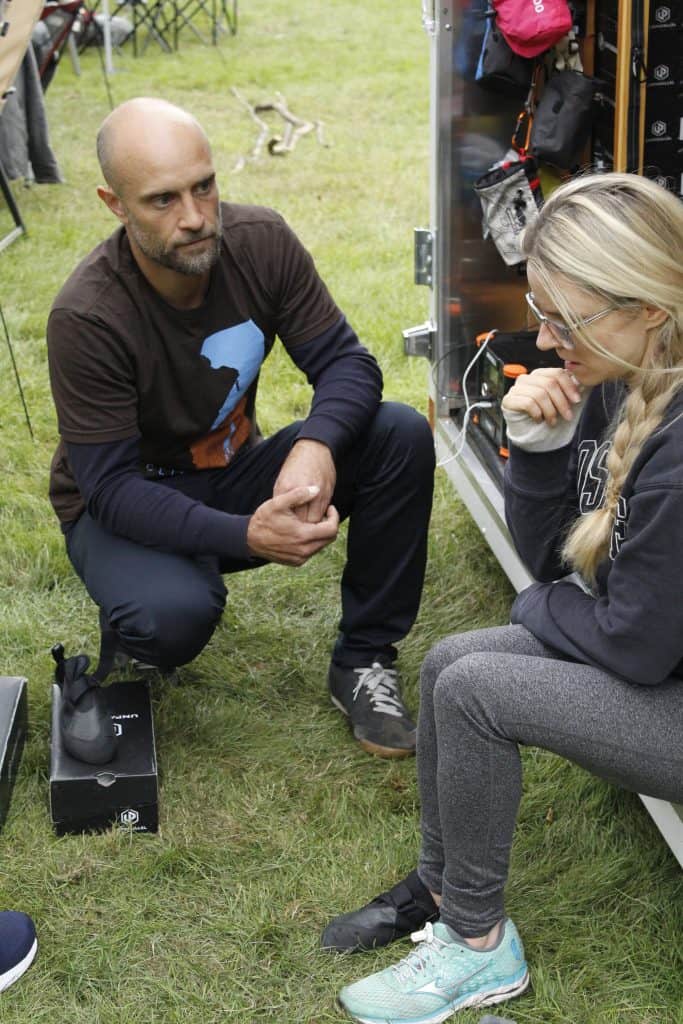
Future Aspirations
MTS – What are your entrepreneurial goals from there?
Levi – My next big goal would be to have a location, a physical space where I can have employees and have the business be open six or seven days a week and not have to personally do it all the time — getting the business to the point where it’s able to run while I’m not there, so I can work on more growth opportunities.
I want to be able to take time off when I want to take time off. I’d like to have money coming in and have the time to climb. People think I must just climb all the time because I’m this traveling climbing salesman. But in reality, I probably have less time available to climb than when I just had a regular job. So, I want to get back to being able to climb more.
MTS – Looking ahead, what do you think is going to make your business model successful?
Levi – What I think makes the business model successful is what has been working so far. Climbers really appreciate getting back to that in-person experience of being able to see, feel, touch, and hold their shoes or equipment before they buy it.
Also, getting really good, solid advice as to why one thing might be a better option than another. Having a really good selection of products at an affordable price is great because people can try it and buy it that day. That’s the key part where we can differentiate ourselves. I definitely want to be the expert that people can come to for advice and get good advice from.
Being very niche in the gear and the shoes allows us to be experts. The competition — any big chain like REI — is very broad in what they do, so they’re just “kind of” good at everything but not really good at any one thing. We want to be really good at what we do, which would be climbing gear, and keep it simple. If we expand into other categories of things, it would only be if we could retain a level of expertise in anything new that we do.
Sales Influences and Lessons
MTS – Who inspires you in the world of sales?
Levi – There’s a guy named Seth Godin whom I have a lot of respect for, and I’m very interested in learning more from him. He’s a pretty famous name in sales and mentorship.
Honestly, I didn’t work on this when I was selling lumber because I didn’t feel like I needed any kind of additional training. In lumber, you just had to competently get the right stuff to the right job on time,, and you were essentially always going to have business. That’s the way it felt to me. I just had to execute, and my customers kept coming back for more.
With this, you’re building something from scratch with the right strategy and techniques. I really went out and tried to learn as much as I could about sales and marketing in general.
Seth Godin has been a tremendous source of that kind of information I’ve sought out and found. He gets really into the psychology of what makes companies great. What makes sales possible? Why do people buy the way they buy? What are the elements that you need to reach your demographic and resonate with them?
He’s got some amazing stuff.
MTS – What are the biggest lessons you’ve learned about sales since you started your own business?
Levi – What’s obvious to me now is how consistency really matters. You have to show up with something valuable to offer every single day to justify why somebody should shop with you instead of anywhere else they could get it. If you lose that, those are the companies that don’t make it or won’t be ultimately as successful as they could be.
When I go to a gym, if it’s only my first or second time there, people are just getting curious, asking, “Why are you here? What is this? Who is this guy?”
One thing that Seth Godin talks about an awful lot is how trust is really important for brands. People have to know you, but they have to trust you. I think consistency builds trust.
MTS – If you could sit down with Seth Godin or another sales expert, what question would you ask them?
Levi – What I’m most curious about is the ways to evaluate my next growth maneuvers. From a strategic standpoint: What should I be paying attention to most when it comes to taking the next risk?
For instance, when is it the right time to outsource things that could lead to the growth of my business? How do I evaluate those decisions?
Whether it’s expanding into a physical space, expanding with employees, or paying for advertising and marketing, what are the key factors as a business owner that I should really pay the most attention to when I’m making those kinds of decisions about where to invest back in the business?
Climbing and Sales Analogies
MTS – Do you have any good climbing/sales analogies?
Levi – Climbing definitely provides a lot of the mental skills that I feel are instrumental in business and sales. You hear a lot about how you really need to control your mindset if you want to be successful — not making decisions for the wrong reasons and maybe not being overly emotionally involved in something.
Keep your focus and your eyes on the prize. When you evaluate opportunities, I think you have to take the emotion out of it to a degree and look at it from the business point of view. Climbing has really honed my ability to breathe, focus, and bring my attention back to what I’m working on.
I think climbing makes you flex that muscle of facing your fears. If you have the fear to continue, face that down and achieve something that you may have doubted yourself in. You went for it anyway, and then you got through it, and that translates to every part of life. Both the emotional control and the willingness to face your fears definitely translate to sales and business ownership.
